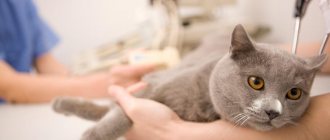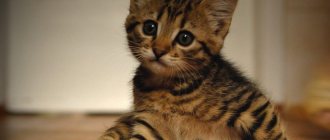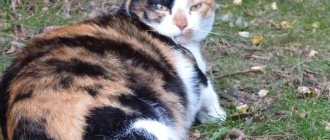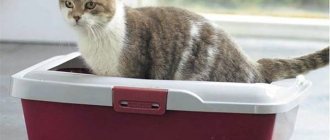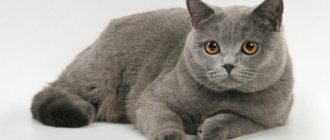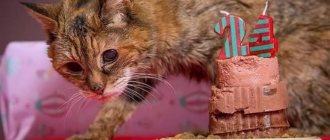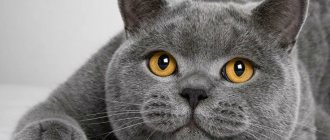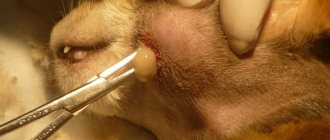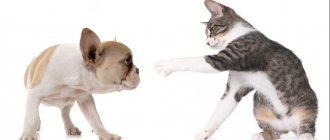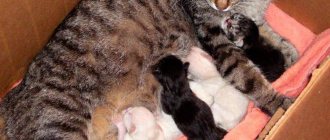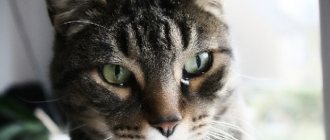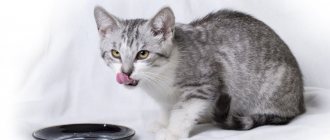7227Pavel
3
A phenomenon that is perceived from people with hostility, misunderstanding, and sometimes with concern for their health, is perceived with affection from cute pets. When a cat farts, we even want to laugh. But why does a cat fart? Perhaps there is no reason to laugh, but is this a warning to us, the owners, that the animal is not in good health? Or is the problem not so serious that you need to worry about it? Let's look at the reasons why a cat farts. And we will understand how to act and what the cat needs.
Causes of gas accumulation
Any gas formation is the result of fermentation. Most often, cats fart due to a violation of their diet, when a large amount of carbohydrates enters the body. The cat practically does not need them: in the small intestine, carbohydrates are broken down into glucose, which is necessary only for brain function. Excess carbohydrates cause bloating: excess gas is released either when the cat farts or when he burps. The remains of carbohydrate-rich food accumulate in the abdominal cavity and begin to rot there, which entails pathological changes in the functioning of the entire animal’s body.
The second reason for the accumulation of gases is the presence of intestinal parasites. Helminths live in the small intestine, irritating its walls and causing general allergies in the body. In large concentrations, intestinal parasites can cause blockage of the intestines and bile ducts. If a cat is infected with worms, it will not only fart frequently, but also suffer from constipation.
The third reason is the swallowing of excess air when quickly eating food. In this case, the cat will more often burp than flatulence. It is enough to reduce the portions and increase the frequency of feeding, and the cat will stop spoiling the air.
The fourth reason is diseases of the digestive system. Most often this is dysbacteriosis. In older animals there is a decrease in peristalsis.
This is interesting: How long does a cat walk for the first time?
Intestinal parasites
If your cat farts repeatedly, the problem may be intestinal parasites. Worms are localized in the small intestine and cause irritation of its mucous membranes and allergic reactions. A large accumulation of helminths leads to blockage of the lumen of the gastrointestinal tract and bile ducts. With parasites, a cat experiences not only increased gas formation, but also constipation.
But there are other sources of flatulence.
- Allergic reactions. Individual intolerance to certain foods causes allergy outbreaks. Pathology is associated with a variety of products, but more often it occurs due to milk sugars, gluten, and artificial components in finished feeds. Cheap varieties contain ingredients that make the animal want to eat them constantly. As a result, it suffers from gas, colic, and pain in the gastrointestinal tract.
- Viruses. Infection occurs through constant visiting of the street. Domestic animals are less likely to become ill with parvovirus compared to free-roaming animals. Average statistical data indicate that every second cat suffers from it due to contact with the outside world.
- Inflammation. The development of pathology is determined by diarrhea, bouts of vomiting, and bad breath. Severe gas formation during the inflammatory process is a secondary symptom. A sick pet requires a visit to the veterinarian and antibiotic treatment.
- Dysbacteriosis. Disturbance of the balance of normal microflora is associated with antibiotic therapy, poor nutrition and subsequent intoxication. The disease provokes disruption of the immune system and flatulence. Do small kittens fart when they have dysbacteriosis? In young animals, the disease is caused by transferring to roughage after mother's milk, from wet to dry food.
- Constipation. A prolonged delay in defecation provokes increased gas formation. An overfilled gastrointestinal tract irritates the pet, and constant discomfort leads to loin riding on the floor and meowing plaintively.
- Impaired functionality of the intestinal system. Pathological inability to process food normally is more common in cats with congenital abnormalities. Other causes of dysfunction include injuries and previous gastrointestinal diseases. Only a veterinarian can determine the source of the disorder after a full diagnostic examination.
- Air entering the stomach. Eager consumption of food leads to belching and gas formation. Increasing the frequency of feeding and reducing the size of portions quickly solves the problem.
Important! If the pet spoils the air regularly, the owner should consult a veterinarian. In some pathologies, ignoring the symptoms can cost him not only his health, but also his life.
Can cats fart: why do cats produce gas?
Veterinarians confirm that cats, like their owners, are not immune to flatulence. This is what doctors call excessive accumulation of gases in the intestines. The strength and frequency of gas discharge is affected by:
- the amount of carbohydrates absorbed by the cat from food;
- organizing a place where the pet eats;
- quality of the selected feed.
Scientists have proven that a cat can fart constantly because of its haste - the desire to quickly empty the plate. At the same time, young individuals suffer from flatulence more often. If kittens eat quickly, you can throw a small ball into a plate of food. This way the pet will have to constantly move its nose, distracting itself from food.
Nutrition and eating habits
Cheap food contains many additives that are harmful to the animal, which negatively affect the functioning of its digestive system.
Fast carbohydrates are well absorbed and do not cause problems.
However, such food should not be more than 15%. It is unacceptable to choose cheap food that contains an abundance of flavorings and dyes. Such artificial components irritate the intestines and stomach, which causes flatulence and other problems with the body. Natural food contains meat, vitamins and ingredients that enhance immunity. It is equally important to provide the kitten with proper access to the bowl. The plate should not be high or very low. Otherwise, the animal will swallow air along with food, which, if repeated regularly, will lead to irreversible disturbances in the cat’s gastrointestinal tract. Foods that cause farts
| Name | Peculiarities | To give or not |
| Fermented milk | Cats fart not from variety or order, but from excess | Up to 3 times a week is possible |
| Soybeans, corn, wheat | Irritates the stomach, triggers the fermentation process | Depends on the initial quantity in the composition |
| Used in feed as a source of protein | ||
| Garlic | Has antihelminthic properties | Forbidden |
| Seriously harmful to the health of the animal | ||
| Fat trimmings | Chicken, beef, fish | Only as a rare supplement |
| bread yeast | Start fermentation processes | Prohibited, especially if the products are spoiled |
| Any food from the table | Rough, unprocessed food, which is dangerous for many purebred animals, such as the Maine Coon |
Physiology or age characteristics
Elderly animals should buy food according to their age to avoid problems with their digestion.
Cats often fart when they are old or young. Young animals simply have an unhardened digestive system, while old pets, on the contrary, may have problems with enzymes that ensure normal breakdown of food. If the stomach is weak, any food is poorly accepted, so veterinarians recommend specialized foods adapted to the age characteristics of the animals.
When is the problem pathological?
In addition to the harmless and easily corrected ones, experts identify dangerous causes of flatulence. These include:
- Individual intolerance or allergy. The disease can arise due to initially incorrectly selected food - too cheap, low-quality, high in gluten, milk sugar.
- Constipation. Often happens due to insufficient fluid, unbalanced nutrition. At the same time, the cat eats a lot, but cannot empty its intestines. This leads to increased gas formation, pain and constipation.
- Congenital anomalies of intestinal development or acquired problems associated with injuries, surgeries and stomach diseases. In these cases, the organ does not perform its functions, food is not digested, and gases with an unpleasant odor are released.
- Dysbacteriosis. With a lack of enzymes for processing food, local immunity decreases, the cat farts constantly, and diarrhea develops. This often occurs after treatment with antibiotics.
- Viruses. The problem is especially common in cats that walk outside. Infection with paraviruses leads to the fact that animals are able to constantly pass gas.
- Inflammation. Flatulence is a sign of the need to urgently consult a doctor. Accompanied by diarrhea, vomiting, bad breath.
Changing your diet
Improper feeding is one of the main sources of indigestion and gas in a cat. A lack or excess amount of food, an incorrectly selected diet, and eating waste from the master’s table provoke gastrointestinal dysfunction. Mature pets are in a subgroup at increased risk for the disease, and their weakened bodies require a sufficient supply of vitamins and minerals.
Note! Good expensive food has a high price, but does not harm animals. They are classified by age, activity level and body weight
They cannot overfeed or underfeed your furry pet.
Why are cheap options not suitable? They have added foreign components - legumes, soybeans, corn. For a carnivorous predator, they are foreign and are poorly digested in the gastrointestinal tract. Artificial flavor enhancers and other flavorings become a favorable source of proliferation of pathogenic microflora.
You cannot buy food according to your pet’s taste preferences. If earlier he avoided foods that were dangerous to health, now manufacturers manage to lull his vigilance with third-party additives
Inexpensive food is made from components that attract attention and interest the animal. The result of saving is a storm in the stomach due to active fermentation
Manufacturers of branded mixtures indicate on the packaging the constituent ingredients: proteins, a mixture of poultry, beef, rabbit and other animals, vegetable fats. They do not contain soy, corn and other components that increase the weight of the feed.
Does my cat pass gas after feeding? They can be caused by disruption of the feeding schedule. Three meals a day are allowed; the best option is morning breakfast and evening dinner. If an animal has access to food all day, overeating results in flatulence and other unpleasant symptoms.
Important! A hungry pet is not able to patiently wait for the time when a careless owner remembers his responsibilities. He starts looking for food in trash cans, on the table, and tries to escape into the street.
This behavior is not the result of curiosity, but a problem that leads to serious illness.
Hungry cats often look in the trash
Do they fart or not?
Owners often ask: “Can cats fart?” Cats fart, and this is a completely normal process of life. However, this happens very rarely. If your cat farts too often, you should pay attention to your pet's health.
During the digestion of food, gases are formed in the cat's intestines. Gases can also form in the stomach due to the action of carbohydrates. Unlike dogs, cats can form a sufficient amount of carbohydrates themselves. Therefore, their increased content in food can cause increased gas formation in the cat’s stomach.
First of all, it is necessary to properly arrange the place for eating. The animal should have a relaxed posture while eating: do not pull its head too low or high, do not throw it to the side.
It is worth taking care of proper nutrition for your pet. Cheap food can be addictive in cats, and they also contain strong allergens. Problems can also arise when feeding an animal with natural food, because under no circumstances should you simply feed a cat fish or cutlets from the table. Natural food must be properly balanced.
If the above measures do not change the situation, and the cat still farts often, you should take him to the veterinarian. Don’t forget that timely measures can save your pet’s life.
For some reason, it is believed that a cat’s stomach can digest slightly spoiled foods that are unsuitable for humans to eat. This is not entirely true. Such food can cause irritation of the mucous membrane of the digestive tract, and even cause food poisoning in the animal, accompanied by gas formation, diarrhea and vomiting.
If you treat your pet with a piece of cake from the owners’ table or a bun, most likely the animal will not refuse the treat. But cats are not people; carbohydrate foods and products containing yeast are not good for them. These foods cause fermentation in the intestines of the baleen-striped. Over time, a cat's passion for baked goods can result in intestinal inflammation.
Since childhood, we have become accustomed to cartoons and fairy tales in which cats enjoy milk and sour cream, and we believe that this is the best food for furry friends. In nature, not a single animal that has emerged from childhood feeds on milk. Adult animals do not produce enough enzymes to digest these foods.
If you actively feed your cat milk, this can lead to lactose intolerance and intestinal inflammation. Cats can digest sour cream and cottage cheese in small quantities, but the amount of these products should be strictly limited. It is better not to give milk to the cat at all. You can pour the animal a saucer of milk one day, and then treat it for 2 months.
Another misconception about cat nutrition is that these animals must eat fish. Cats are carnivores, but their diet should predominantly consist of meat. Fish can be present as a delicacy (no more than 2 times a week) in the pet’s menu, but in no case in raw form. More often, fish causes the formation of kidney stones in animals, cats are especially susceptible to this.
Spicy vegetables
Onions, garlic, spices - all this irritates the intestines of a pet and can cause gastritis and colitis. Inflammation of the intestinal mucosa is accompanied by stool disturbances and flatulence.
We suggest you read: How to vaccinate a cat
Some owners mistakenly believe that garlic can be used to fight helminthic infestations in cats. There is such a folk method of getting rid of intestinal parasites in humans. Even for humans, it is controversial, although popular. You should not use it on your pet under any circumstances.
If you give a cat connective tissue scraps from meat (fascia, cartilage, fat), most likely he will swallow them. But this is an unequal substitute for meat. If fat predominates in the animal’s diet, this can cause indigestion, liver dysfunction, flatulence, and diarrhea. If fatty foods are the basis of your pet’s diet, over time this will result in chronic diseases of the digestive system.
Cereals
Some cats are very picky about food, while the owners of others boast that their pets are omnivores. Even if the cat complacently eats everything that the owner offers, it is impossible for the diet to be based on wheat, corn or soybeans. These products lead to increased gas formation and disruption of intestinal function.
However, despite the fact that sphinxes are calm about such events in their lives, you should not push them from your place rudely. Carefully move your pet to another place or simply verbally ask to “move.” The Sphinx will definitely listen and lie down next to you, waiting for you to get comfortable.
WHY SPHINXES SLEEP A LOT
Normally, cats sleep up to 16 hours daily, and even in the remaining 8 hours of the day they can fall into a state of light doze for a long time. This is very important for the sphinx, because it is this condition that allows its body to recover and ensure normal functioning of all tissues in general and the nervous system in particular. If your Sphynx doesn't sleep enough, he will quickly become irritable and aggressive and may even get sick.
This phenomenon has not been fully studied, but regardless of whether the cat is sleeping or awake, it continuously receives the information it needs from the outside world. A cat's sleep phases constantly alternate between deep and superficial, which is easy to notice by the twitching of whiskers and paws, the movement of claws and ear movements. No matter what happens around, the Sphinx's brain is equally active, and the animal is constantly on the alert.
WHY ARE SPHINXES AWAKE AT NIGHT?
Another reason why your cat may seem to sleep a lot is because of its special lifestyle. Cats prefer to stay awake at night. This is due to both genetic characteristics and the characteristics of the cats themselves: they have always been nocturnal animals, because it was at this time of day that their hunting instinct woke up.
WHY SPHINXES LOVE HEIGHTS
Sphynxes love to climb onto the refrigerator or the highest cabinet, and this is not surprising - this is another manifestation of the hunter's instinct! It is in the genes of cats that they want to climb trees, and in the absence of such, they climb onto furniture. In this way, the cat manages to control the situation in the house and monitor it from above in order to jump off at the right moment and intervene in what is happening.
If you carefully observe your beloved Sphynx, you will be able to unravel many secrets and cat tricks, and understand the behavior of your pet that seems strange at first glance.
come back
Excessive gas in your cat may be a sign that your cat is suffering from one of the following conditions:
- Intestinal inflammation
- Enteric viruses
- Bowel cancer
- Intestinal parasites
- Pancreas problems or disorder
- intestinal obstruction
- Food allergies
What causes increased gas formation?
The following reasons will tell you why a cat farts and why the intestines do not function normally:
- Individual intolerance. Allergies are associated with a negative reaction of the body to certain foods. Most often these are gluten, milk sugar, and artificial ingredients in dry and liquid food. A striking example is budget food. Cheap formulations add elements that cause addiction in the animal, which then farts, suffers from gas and colic.
- Constipation. If a pet cannot empty its intestines or fart, this will inevitably lead to gas formation and other processes that cause discomfort to the cat.
- Limitation of intestinal functions. The pathology of the inability of the intestines to process food is most often a congenital problem. Other factors include injury or previous stomach illnesses. An accurate diagnosis can only be made with long-term observation by a doctor.
- Dysbacteriosis. For normal functioning, the stomach and intestines will need positive microorganisms. Their deficiency leads to decreased immunity and problems with flatulence, when the animal farts constantly. Bacteria are destroyed due to active use of antibiotics or through toxicity.
- Viral infection. If a cat goes outside and does this more than once a day, catching the virus is easier than ever. The most common is parvovirus, found in every second street reveler, for whom farting becomes the norm.
- Inflammatory process. Diarrhea, vomiting, and bad breath will help identify the presence of inflammation. Flatulence in such diseases is a side effect, signaling that it is time for your pet to see a veterinarian.
In addition to diseases, you should also know about the natural reasons why a cat farts a lot.
Firstly, this is an increased amount of carbohydrates in the body. According to regulations, food for adults should not contain more than 15% carbohydrate particles. Moreover, it is better if these are so-called fast carbohydrates, the digestion and processing of which will not cause problems in the intestines and will not lead to farting.
Secondly, we must not forget about the rules for organizing a place to eat for a cat. When the bowl is too low or high, the cat is forced into an awkward position. This leads to air entering the stomach and natural gas formation, farting. If an animal farts and constantly faces such problems, there is a high risk of critical disruption of digestive processes.
Those who skimp on pet food face this problem more often. The cat farts very often, which is a consequence of exposure to artificial ingredients and flavoring additives that negatively affect the stomach, intestines and the body as a whole. Branded formulations are prepared from natural meat and include the entire vitamin complex aimed at strengthening the immune system.
According to doctors' studies, the main reason that a furry animal farts is swallowing air. Diseases and poor quality of feed take second place. But flatulence is always an individual indicator, although in a healthy cat gases pass out within two hours after eating and in most cases unnoticed by others.
A cat may also swallow air due to its own clumsiness. This is a common problem for kittens who want to eat constantly and try to empty the bowl as quickly as possible. Young cats fart more often. A plastic ball will help moderate the ardor. In this case, the kitten will have to select food and move the ball with its nose, which will significantly slow down its eating.
Changing your diet
Improper feeding is one of the main sources of indigestion and gas in a cat. A lack or excess amount of food, an incorrectly selected diet, and eating waste from the master’s table provoke gastrointestinal dysfunction. Mature pets are in a subgroup at increased risk for the disease, and their weakened bodies require a sufficient supply of vitamins and minerals.
Note! Good expensive food has a high price, but does not harm animals. They are classified by age, activity level and body weight
They cannot overfeed or underfeed your furry pet.
Why are cheap options not suitable? They have added foreign components - legumes, soybeans, corn. For a carnivorous predator, they are foreign and are poorly digested in the gastrointestinal tract. Artificial flavor enhancers and other flavorings become a favorable source of proliferation of pathogenic microflora.
You cannot buy food according to your pet’s taste preferences. If earlier he avoided foods that were dangerous to health, now manufacturers manage to lull his vigilance with third-party additives
Inexpensive food is made from components that attract attention and interest the animal. The result of saving is a storm in the stomach due to active fermentation
Manufacturers of branded mixtures indicate on the packaging the constituent ingredients: proteins, a mixture of poultry, beef, rabbit and other animals, vegetable fats. They do not contain soy, corn and other components that increase the weight of the feed.
Does my cat pass gas after feeding? They can be caused by disruption of the feeding schedule. Three meals a day are allowed; the best option is morning breakfast and evening dinner. If an animal has access to food all day, overeating results in flatulence and other unpleasant symptoms.
Important! A hungry pet is not able to patiently wait for the time when a careless owner remembers his responsibilities. He starts looking for food in trash cans, on the table, and tries to escape into the street.
This behavior is not the result of curiosity, but a problem that leads to serious illness.
Hungry cats often look in the trash
How to deal with flatulence
If the cat owner is confident that he is buying high-quality food, monitoring the hygiene of the eating area and caring for the animal properly, he should contact a veterinarian. Experts will conduct a number of studies:
- Visual inspection. The doctor palpates the peritoneum and examines the hair and body. Some neoplasms and the consequences of internal diseases appear on the coat, which loses its former fluffiness and shine.
- Blood analysis. Helps clarify liver and kidney parameters, get an idea of immunity and possible stomach problems. Along with this, stool and urine analysis is taken.
- Ultrasound diagnostics. This includes an x-ray examination. It is necessary when there is a suspicion of third-party formations inside the abdominal cavity and intestines that interfere with bowel movements and contribute to constipation and gas formation.
Preliminary preparation will help make the veterinarian’s task easier and understand why the cat farts and passes gas. You should create a detailed daily routine, describe the activity and subtleties of caring for your pet. Long-haired cats require periodic brushing. When self-grooming, the pet swallows hair, which remains in the intestines and interferes with the natural processes of digestion.
This is interesting: Fleas on a cat - how to remove them at home
What to do?
Conversation with a doctor
Before doing anything, the owner should show the animal to the veterinarian and consult with him.
If your cat farts frequently, it is important to visit your veterinarian before starting treatment. The specialist will determine the cause by examining the animal, the quality of the coat, the condition of the mucous membranes, as well as palpation of the abdominal cavity. The owner will be interviewed about food habits, hygiene and overall care of the pet. Additionally the following will be appointed:
- tests for general, renal and liver parameters;
- Ultrasound or x-ray.
A long-haired kitten needs special care because, while licking itself, it swallows a lot of hair, especially during the molting season. This creates additional problems with the intestines and regular farting against this background. Such animals need to be constantly combed.
Revision of diet
Since the problem often lies in nutrition, you need to focus on this. Food should be selected according to the age and health characteristics of the pet. It is worth adjusting the drinking regime and vitamin supplementation. Feed portions must be followed exactly as recommended based on the cat’s weight, activity, and breed characteristics. Nutrition should be natural, because artificial additives activate the growth of pathogenic bacteria in the intestinal microflora.
It is important that the animal does not eat more than three times a day.
Veterinarians insist on a consistent feeding schedule. Cats cannot regulate their appetite on their own. If you give free access to the food plate or feed it too often, the food will not have time to be digested and the cat will fart. The optimal feeding regimen is 2-3 times a day. It is forbidden to allow a cat to eat table scraps in the trash can. This threatens severe gastrointestinal diseases.
How do gases form in the intestines of animals, does this happen in cats?
Gas is a byproduct of digestion. They are formed in the intestines of every animal and are the result of the vital activity of bacteria in the intestines. During the digestion of food, microorganisms secrete enzymes that convert the substances absorbed from it into vitamins and other components necessary for the body.
In the process of breaking down food by anaerobic bacteria, a certain amount of gases is formed, which are partially absorbed by them and partially remain in the intestines. If the animal’s body functions without failures, a small amount is absorbed into the bloodstream, while most leaves the body through the rectum.
These substances consist of:
- oxygen;
- nitrogen;
- carbon dioxide;
- hydrogen;
- a small amount of methane.
The components of intestinal gases are odorless. It appears due to substances containing sulfur, which are secreted by bacteria that live in the large intestine. Cats, like any other animal, produce gases in their bodies.
Flatulence in a pet
Gas in a cat is a common occurrence in veterinary practice. If she passes a small amount of gas 2-4 hours after eating food, this is part of the digestive process and is considered normal. About 90% of the gases released are methane, which has no odor. But if a pet farts more often than usual, and the passage of gas is accompanied by a terrible “amber” and some other signs, this already indicates that he has flatulence.
Flatulence in cats is the process of distension and bloating of the abdomen due to the accumulation of gases and air in the stomach or intestines, which the animal swallows while eating food. The unpleasant odor is the result of the release of hydrogen sulfide and other substances, and the excretion of the resulting excess through the anus is considered a normal physiological phenomenon inherent in all mammals.
Excessive gas production does not mean that a disease is developing in the cat’s body. It is likely that the four-legged pet simply ate food that was unusual for him, and his intestines did not have time to produce enzymes to digest it.
But if flatulence takes a chronic form, this indicates diseases of the gastrointestinal tract. In addition, accumulated gases put pressure on the diaphragm and make breathing difficult. This can cause shock in your pet and even death.
Why does a kitten or an adult animal have increased gas production, and why is this dangerous?
Excessive gas formation is most often observed in kittens and older cats. This problem may be caused by the following in your pet's diet:
- Dairy products. When preparing your pet’s diet, you need to ensure that the animal consumes these foods no more than 2-3 times a week.
- Soybeans, corn and wheat , which irritate the stomach of a four-legged pet and cause fermentation in it. Despite this, such components are used by many feed manufacturers as a source of vegetable protein.
- Garlic and onion. These products have excellent anthelmintic properties, but they can lead to serious problems with the digestive system.
- Tomatoes.
- Cabbages.
- Potatoes.
- Fatty foods. It doesn’t matter what kind of fat it is - chicken, beef or fish, in large quantities it is contraindicated for cats.
- Bakery products. The yeast contained in these products provokes fermentation.
- Spoiled finished food. Many people mistakenly think that animals are able to digest absolutely any food. It's not like that at all. Poor quality food can provoke irritation of the mucous membrane of the digestive tract and even cause intoxication of the body, accompanied by excessive gas formation, diarrhea and uncontrollable vomiting.
There are other causes of flatulence in cats:
- Obesity.
- Aerophagia. Swallowing air is accompanied by the cat's hasty and greedy eating of food. During the rapid absorption of food, a lot of air enters the animal’s body, which accumulates in the digestive canal. Aerophagia in representatives of the cat family can be of a psychogenic nature. For example, some cats that have suffered severe emotional shock eat very quickly, swallowing air. If an animal is stressed, it may swallow air without even eating.
- Blockage of the stomach with hair that gets into it during licking.
- Worm infestation.
- Constipation. Difficulty with spontaneous bowel movement can be caused by various factors, such as blockage of the intestine with bezoars, ingestion of a foreign body, parasitic infection, neoplasms in the intestine, etc.
- Dysbacteriosis , characterized by an insufficient number of beneficial microorganisms in the intestines of an animal.
- Intestinal inflammation of bacterial or viral etiology.
- Tumors in the intestines.
- Intestinal viruses.
- Various gastrointestinal pathologies.
- Cardiovascular diseases.
- Diseases accompanied by impaired nasal breathing.
Despite the seeming harmlessness of this phenomenon, it is extremely dangerous for the health and life of the pet. Excessive gas formation in these animals can provoke:
- chronic bloating, which will lead to exhaustion, because the intestines will not be able to fully absorb food;
- compression of internal organs, causing disruption of local blood circulation in the affected area;
- ruptures of the stomach and intestines;
- failure of the digestive system;
- inflammation of the bladder and other diseases of the urinary system.
Medicines as a last resort
If the problem cannot be resolved using classical methods, medical help is needed. For a cat, the doctor can prescribe enterosorbents in children's dosages, drugs with simethicone, for example, Espumisan, carminatives and microflora regulators. A gas vent tube may need to be installed. If the problem is associated with a parasitic, bacterial or viral infection, you will need to take antihelminthics, antibiotics or antivirals, respectively. If the cause is an ulcer, then you need to have surgery.
We suggest you familiarize yourself with Pygmy marmoset - qwertyu.wiki
Treatment of flatulence
Most often, increased gas formation is associated with errors in the cat’s diet. You need to feed her in small portions, fresh food. Correctly plan your pet’s diet or feed it with ready-made balanced food. Eliminate milk, bread and spices from your diet. Cats must receive meat, but not fat or chicken (duck) skin.
If gas formation is excessive and causes anxiety for your pet, you can give him enterosorbent in a children's dosage or simethicone preparations (Simethicone, Espumisan). And take him to the clinic for a consultation to rule out serious pathologies of the digestive system.
Treatment is carried out depending on the cause of the pathology. These can be anthelmintics, antibiotics and antimycotics. If intestinal ulcers form, surgery may be indicated. In mild cases, veterinarians prescribe drugs that regulate intestinal microflora and carminative drugs. If necessary, a gas tube can be inserted.
Owners sometimes don’t even know if a cat is farting, because unlike humans, animals do it very quietly. Flatulence in cats becomes obvious with the appearance of a foul odor.
The first measure is to change the diet, even if the cat eats only special food. You will have to experiment to find out what causes the accumulation of gases in the animal. To prevent your cat from swallowing excess air, it is recommended to soak ready-made dry food first.
If an unpleasant odor appears during the release of gases, the animal should be shown to a veterinarian. If the doctor diagnoses “dysbacteriosis”, then probiotics will be needed, most often Lactoferon. Together with them, you will need to help the body get rid of toxins by giving activated charcoal or Atoxil. Smecta will help eliminate irritation of the intestinal walls, and Espumisan will help reduce gas formation. Kittens can be fed with dill water.
Food allergies and intolerances to certain foods are treated with antihistamines. In severe cases, the cat will be prescribed antibiotics. If gas formation is associated with pathology of internal organs (with intestinal obstruction), surgery is performed.
Increased gas formation occurs due to errors in the cat’s diet. You need to feed your kitten fresh food in small portions. Spices, bread, and milk should be removed from the diet. It is imperative to feed your pet meat, but not chicken skin or fat.
If gas formation is frequent and causes discomfort to the animal, you need to give enterosorbent in a child's dosage or simethicone preparations (espumisan, simethicone). After this, take the cat to the veterinarian to rule out the possibility of a serious pathology of the food system.
Antibiotics, anthelmintics, or antimycotics may be prescribed as therapy. If ulcers are found in the intestines, surgery is performed. In mild cases, the specialist prescribes drugs that regulate microflora and carminatives. In some situations, a gas tube may be inserted.
Flatulence in a pet
Gas in a cat is a common occurrence in veterinary practice. If she passes a small amount of gas 2-4 hours after eating food, this is part of the digestive process and is considered normal. About 90% of the gases released are methane, which has no odor. But if a pet farts more often than usual, and the passage of gas is accompanied by a terrible “amber” and some other signs, this already indicates that he has flatulence.
Flatulence in cats is the process of distension and bloating of the abdomen due to the accumulation of gases and air in the stomach or intestines, which the animal swallows while eating food. The unpleasant odor is the result of the release of hydrogen sulfide and other substances, and the excretion of the resulting excess through the anus is considered a normal physiological phenomenon inherent in all mammals.
Excessive gas production does not mean that a disease is developing in the cat’s body. It is likely that the four-legged pet simply ate food that was unusual for him, and his intestines did not have time to produce enzymes to digest it.
But if flatulence takes a chronic form, this indicates diseases of the gastrointestinal tract. In addition, accumulated gases put pressure on the diaphragm and make breathing difficult. This can cause shock in your pet and even death.
The appearance of parasites in a kitten should never be ignored. It is extremely wrong to believe that worms in animals are normal. If the owner discovers that the kitten has such parasites, it is necessary to take immediate action. To do this, you should contact a veterinarian or simply buy the appropriate drug at a pet store. Otherwise, the parasites will multiply in the kitten’s intestines, and this can even lead to death.
Features of the stomach
A cat's stomach is single-chamber. The inside is lined with a mucous membrane that produces gastric juice. There are two openings from the stomach: one opens into the esophagus, and the other opens into the small intestine.
The cat's stomach serves to store food and control the rate at which food enters the intestines and secretes enzymes necessary for the digestion process. Mixing and grinding of food occurs in it. With muscle movements, it directs food into the small intestine.
When food enters the stomach, its bottom relaxes to reduce intragastric pressure. The smell and taste of food causes the secretion of gastric juice. Digested food is sent to the intestines, and its undigested part remains in the stomach. The more caloric a food is, the slower it is digested.
Main reasons
Flatulence in animals and humans is a consequence of the accumulation of large amounts of gases in the stomach and intestines. In cats, it is associated with swallowing air while eating, or when food is absorbed too quickly; moreover, the pathology manifests itself when there are serious problems in the body.
Flatulence in cats is also observed if there are too many cereals made from soy, corn and wheat in its menu. Cereals cause stomach irritation and fermentation, although they are often included in dry food for cats, or they are used to make porridge with minced meat.
Dairy products are also not exactly what they need; sour cream, milk, kefir or cottage cheese can be given to them no more than three times a week.
Garlic should not be given to cats along with minced meat or fish.
How to tell if a cat is farting
With flatulence, the animal experiences rumbling sounds in the abdomen; palpation examination shows an increase in the intestinal volume, moderate pain when touched. The pet can sleep peacefully, but when the accumulated gases escape, it suddenly wakes up, jumps on its paws, and meows.
The pathology provokes the development of diarrhea and constant anxiety in the furry pet. If a cat farts, then the problem is related to the inability to fully process the food it eats. Flatulence indicates an incorrect diet or the formation of gastrointestinal diseases.
Good and bad food
The anatomical structure does not provide for increased gas formation due to the short digestive tract. This feature helps the body quickly absorb nutrients and remove metabolic products. Improper care of your pet leads to cats periodically farting.
For your information! According to statistics, young and older animals are susceptible to similar anomalies. Middle-aged cats suffer from flatulence due to the fault of their owners.
Clinical picture
Of course, when a cat constantly passes gas, the diagnosis is quite simple. But it’s still worth remembering that there are other clinical signs that directly indicate flatulence:
- Vomit.
- Diarrhea or constipation.
- Rumbling in the stomach, also known as borborygmy. Occurs when intestinal gas bubbles begin to “roll” in the intestines.
- Copious release of gases through the anus. Sometimes the smell is so strong that it is impossible to be in the same room with the animal.
- Muscle spasms causing severe pain. It is impossible to touch the stomach of a sick cat, since the animal reacts to such attempts very inadequately and aggressively.
In addition, the stomach of a sick pet noticeably swells and feels like a drum . The muscles become very tense. The cat cannot lie or sit quietly, constantly fidgets, and sometimes howls in pain. A pet in this state refuses food, and thirst may persist.
Causes, symptoms and diagnosis
Having noticed that flatulence constantly bothers your cat, you should not go to extremes, come up with terrible diagnoses, and even less self-medicate. Let’s immediately say that flatulence can occur for hundreds of reasons; we will give the most common ones. So, increased gas production can be associated with a number of ailments or abnormalities in the body’s functioning:
- Constipation - a cat cannot empty its intestines in a timely manner for some reason.
- Allergies or individual intolerances – cats may be intolerant to certain substances, such as milk sugar or gluten. Against the background of immunity, a four-legged animal can happily consume harmful foods, and then suffer from gases.
- The inability of the intestines to properly digest food can be due to a number of reasons, from paresis and insufficient peristalsis to metabolic disorders. Such a problem can only be identified by long-term monitoring of the condition of the cat.
- Dysbacteriosis is a condition caused by an insufficient number of beneficial bacteria in the intestines of an animal. Friendly microorganisms may be destroyed by antibiotic treatment or replaced by other microorganisms.
- Intestinal inflammation is infectious or bacterial - typical signs: diarrhea, vomiting, frequent belching, bad breath.
- Intestinal viruses, such as parvovirus.
- New growths in the intestines, including benign ones.
- Other diseases of the gastrointestinal tract.
In addition to illness, flatulence can be associated with aspects of care. After analyzing the points below, you will understand why a cat farts:
- A diet high in carbohydrates - the cat’s menu should contain fast carbohydrates, but according to generally accepted rules, no more than 13-20% of the total food (for adult cats).
- Incorrect body position while eating food or water - when the bowl is low and uncomfortable and the cat has to take an unnatural position while eating, this leads to swallowing air. A similar situation occurs if the bowl slides on the floor while eating. A small amount of swallowed air is released in the form of belching. If a cat constantly swallows air, this leads to poor digestion and the development of severe flatulence.
The volume of accumulated gases is a very individual indicator. In some cats, flatulence is almost unnoticeable (gases pass for up to 2 hours), while for others it brings noticeable inconvenience: vomiting, diarrhea, severe gurgling in the intestines and, as a result, cramps. It has been established that the main factor in the development of flatulence is swallowing air, followed by swallowing food too quickly.
The problem of swallowing air can be solved relatively easily - purchase a non-slip mat or stand for the bowl. It is more difficult to fight flatulence if it is caused by the fermentation process. If you suspect that the cause of gas accumulation is insufficient quality care, you will find instructions for action in the next section.
If everything is fine with your diet and you are sure of it, you need to go to the clinic and conduct a series of examinations:
- Examination of the cat and palpation of the peritoneum.
- Complete blood test, including kidney and liver parameters.
- Urine and stool analysis.
- Ultrasound and, if necessary, X-ray examination of the abdominal cavity with contrast.
Bloating in a cat due to flatulence
So that you have no doubt that your cat really has flatulence and not some other disease, we suggest that you familiarize yourself with the characteristic symptoms of this disorder. So, the cat behaves restlessly, meows pitifully and tries to attract your attention, or, on the contrary, hides in a dark corner and sits there, showing no signs of life.
The essence of the problem
To understand why a cat farts, you need to understand the algorithm of the pet’s digestive system. Gases are formed in the intestines, and the reason for this is the digestion of food. A small accumulation of gas is normal, but if your cat is constantly farting, there is definitely a problem.
Increased gas formation is associated with fermentation, and this process occurs with excessive consumption of carbohydrates. Unlike dogs, cats do not need large amounts of carbohydrates. In fact, your pet only needs protein food. The cat's body synthesizes a small amount of carbohydrates, which are enough to feed the brain; otherwise, the animal only needs proteins, fats and amino acids.
If flatulence and constant release of gases occurs due to poor nutrition, first of all, you need to bring the cat’s diet back to normal, and do this not immediately, but gradually.
You need to feed your cat more often, but not in large portions. To prevent her from swallowing food too quickly, for fear of competition from other cats, give her food separately.
Keep your cat's food and water clean; anything that is stale or of poor quality must be removed immediately.
Play with your cat more to keep her active. Movement and physical activity will benefit her.
How can you reduce or get rid of gas?
You can record what your cat eats throughout the day to find out which foods may be causing the gas. Next, you can follow these tips:
- Gradually change your diet to a low-fiber diet. Ask your veterinarian for recommendations for a smooth transition.
- Feed your cat smaller meals more often.
- Feed several cats separately to avoid competition for food.
- Keep your cat away from trash and spoiled food.
- Keep your cat active and make sure she gets regular exercise.
We invite you to familiarize yourself with Ternetia - a fish with a black skirt
